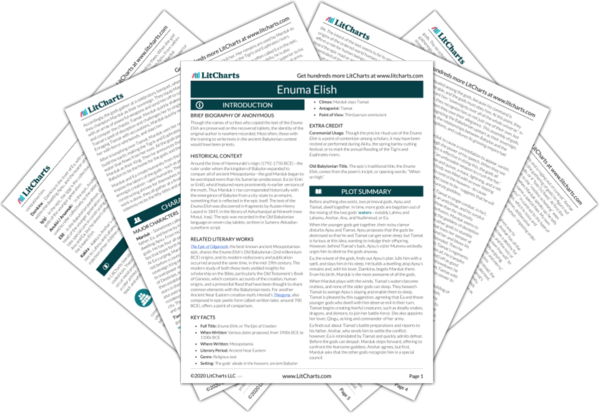Apsu Quotes in Enuma Elish
When skies above were not yet named
Nor earth below pronounced by name
Apsu, the first one, their begetter
And maker Tiamat, who bore them all,
Had mixed their waters together.
But had not formed pastures, nor discovered reed-beds;
When yet no gods were manifest.
Nor names pronounced, nor destinies decreed.
Then gods were born within them.
Apsu made his voice heard
And spoke to Tiamat in a loud voice,
'Their ways have become very grievous to me.
By day I cannot rest, by night I cannot sleep.
I shall abolish their ways and disperse them!
Let peace prevail, so that we can sleep.'
When Tiamat heard this,
She was furious and shouted at her lover;
She shouted dreadfully and was beside herself with rage,
But then suppressed the evil in her belly. 'How could we allow what we ourselves created to perish?
Even though their ways are so grievous, we should bear it patiently.'
Inside pure Apsu, Marduk was born.
Ea his father created him,
Damkina his mother bore him.
He suckled the teats of goddesses;
The nurse who reared him filled him with awesomeness;
Proud was his form, piercing his stare.
Mature his emergence, he was powerful from the start.
Anu his father's begetter beheld him,
And rejoiced, beamed; his heart was filled with joy.
He made him so perfect that his godhead was doubled.
Elevated far above them, he was superior in every way.
Tiamat was stirred up, and heaved restlessly day and night.
The gods, unable to rest, had to suffer . . .
They plotted evil in their hearts, and
They addressed Tiamat their mother, saying,
'Because they slew Apsu your lover and
You did not go to his side but sat mute,
He has created the four, fearful winds
To stir up your belly on purpose, and we simply cannot sleep!
Was your lover Apsu not in your heart?
And (vizier) Mummu who was captured? No wonder you sit alone!
Are you not a mother? You heave restlessly
But what about us, who cannot rest? Don't you love us?
Our grip(?) [is slack], (and) our eyes are sunken.
Remove the yoke of us restless ones, and let us sleep!
Set up a [battle cry] and avenge them!
Con[quer the enemy] and reduce them to nought!'












